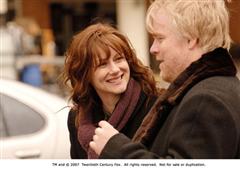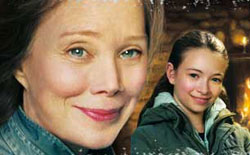 Siblings putting their father in a nursing home may hardly seem like the stuff of great movies, but thanks to a couple of amazing performances and a large dose of humor mixed into its drama, “The Savages” is touching, funny, and engaging.
Siblings putting their father in a nursing home may hardly seem like the stuff of great movies, but thanks to a couple of amazing performances and a large dose of humor mixed into its drama, “The Savages” is touching, funny, and engaging.
Those great performances come from two of my favorite actors, Philip Seymour Hoffman and Laura Linney, playing brother and sister (their last name is Savage, hence the movie title), two immature, self-absorbed adults long estranged from their mean SOB of a father. And he was the better of their parents, having raised them, however abusively, after their mother walked out on the family. Hoffman’s Jon is a professor of drama plugging away in Buffalo, N.Y., on his scholarly treatment of Brecht, his Polish girlfriend facing deportation while he insists he’s not ready for marriage. Linney’s Wendy is a struggling New York playwright who temps as her day job and is sleeping with her married neighbor.
Then the phone rings, and the siblings must come face to face with a reality so many of today’s Boomers are facing: Their father needs full-time care. He’s suffering from Parkinson’s disease and the dementia that comes with it. And so the children become the parents, however reluctantly at first. As they process this news and assess the situation, they cycle through the familiar emotions–grief, fear, self-pity, and guilt. Unsure of what to do, how much responsibility they must take for a father who was not much of a father, and they argue with one another frequently about the best course of action.
They decide to fly him to Buffalo and put him in a nursing home near Jon’s home, while Wendy stays with her brother for several weeks to help with the transition. Wendy is guilt-ridden by the cold, institutional feel of the nursing home, while Jon takes a more cynical view, believing the touchy-feely pastoral setting of other homes is a facade to placate guilty relatives, and that all nursing homes are ultimately the same; he prefers the convenience and stability of the home in which they’ve placed their father.
Both Wendy and Jon are nuanced, three-dimensional characters at times generous and warm and self-aware, and at other times infuriatingly selfish and laughably immature. Despite their mixed feelings for their father, they step up and do what they must, out of the mixed sense of loyalty, responsibility, love, and gratitude all children feel in different doses.
The one big off note in “The Savages” is its portrayal of the father’s illness, which I felt was underplayed. He goes from living independently to needing full-time care with no interim steps, and the first overt sign of his illness, we are meant to believe, is a repulsive moment of supposed dementia aimed toward his ailing girlfriend’s home-health aide. At first, I took the scene to be the antics of the mean SOB the father clearly was, not illness. We do see him frail and publicly humiliated in one scene, as the siblings fly him East, but in the film’s focus on Wendy and Jon, we don’t see enough of the frailties and everyday indignities that mark Parkinson’s and so many other such diseases.


